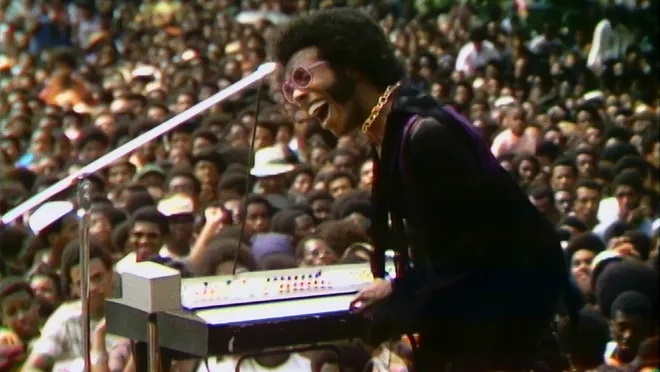
It all begins with the taking of the hand.
Take my hand and come with me. Come with me to the park where the music will play. We’ll celebrate together there. We’ll celebrate our community, our music, our heritage, our lives.
The film Summer of Soul, just as a good neighbor should, takes us by the hand and walks alongside us to experience something beautiful. To experience it together with us. It takes us by the hand to participate in what feels like a sacred moment in history. This is a sacred moment in Black history, yet it is also a sacred moment for all colors of eyes and ears that are open to apprehend its wonder. This is the Harlem Cultural Festival, summer of 1969.
The festival was a grand carousel of music, but also a momentous opportunity to celebrate Black culture and politics. 300,000 listeners gathered to listen, dance, and rejoice together at Harlem’s Mt. Morris Park. Those listeners heard performers from Sly and the Family Stone to the Staple Singers, from the 5th Dimension to Nina Simone.
Among many stunning moments, attendees experienced one moment of such transcendence that you couldn’t imagine it wasn’t seen and heard round the world. This moment comes on the heels of activist Jesse Jackson reminding the crowd of Martin Luther King, Jr.’s last words. Moments before his death, King had requested that one of his musicians play “Take My Hand, Precious Lord” at that evening’s planned fund raiser. Noted to be MLK’s favorite song as well as a frequent choice at rallies to be sung by gospel great Mahalia Jackson, the song includes the words, “Take my hand, precious Lord/And lead me home.”
At the Harlem Cultural Festival, we see Mahalia present and ready to sing that song with all of its rich associations and deep significance. Right before she sings it, though, she invites the younger gospel singer Mavis Staples to sing it with her because Mahalia is not feeling well at that moment. Staples begins the song, with Mahalia then taking the mike for the next verse. Mahalia gives the mike back to Staples, and after that, the two women take turns sending their voices out to the endless crowd. There they are, standing together in song and in purpose.
When Mahalia hands the mike back to Staples near the end of the song, it is a picture of this elder statesman leading the younger singer by the hand into this great song. She is leading her not only into the song, though, but also leading her into this moment of simultaneous celebration and grieving. If we look at the lyrics, we see that she is also inviting her fellow singer to cry out with her to the Almighty. This cry is an invitation for the Lord to take both of their hands. As the divine hand takes their hands, we can then imagine that hand being extended to the many thousands of listeners in Mt. Morris Park on that day. They take the divine hand together.
The film takes us by the hand, guides us through this moment in history, and invites us to see “how beautiful it was!” The hand is taken, the love is shared, and it is a moment we experience together.
== Brian Duignan (2022)
- Directed by: Questlove
- Produced by: David Dinerstein; Robert Fyvolent; Joseph Patel
- Written by:
- Music by:
- Cinematography by: Shawn Peters
- Editing by: Joshua L. Pearson
- Release date: 2021
- Run time:118
- Language: English
Arts & Faith Lists:
2022 Top 25 Movie Musicals — #23